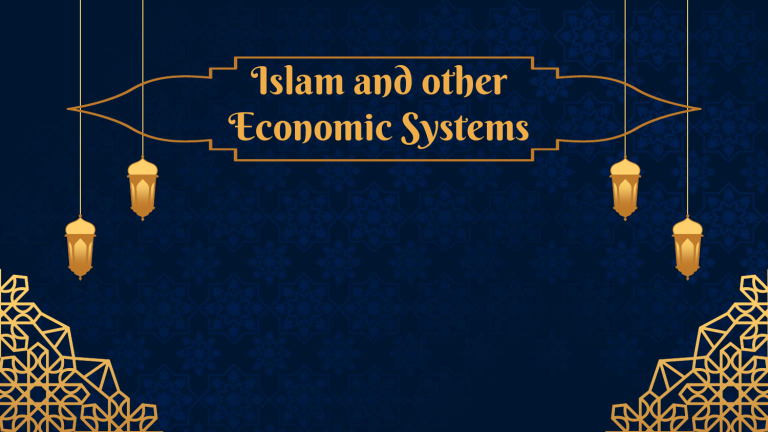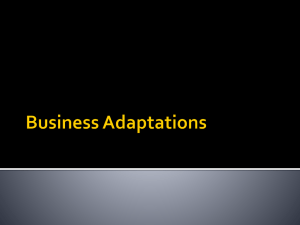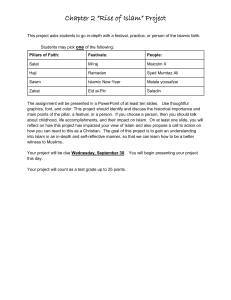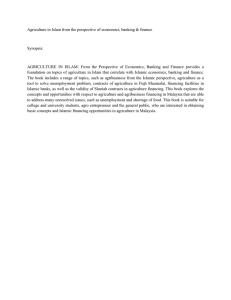
Islam and other Economic Systems Table of contents 01 03 Economic System of Islam Fundamental Features of Economic System in Islam 02 Ideological Foundations of Islamic Economics 01 Economic System of Islam The Meaning of Economic System in Islam: The Islamic economic system is a mode of satisfying the economic needs of an organized society in accordance with the injunctions of the Quran and the Sunnah. It is regulated by certain values, such as piety, justice, benevolence, cooperation, brotherhood and equality, which are eternal and immutable. Consumer, producer and trader must abide by these values.. Important Institution of the Economic System: The economic system of Islam is composed of many institutions, organizations and laws. These include private ownership, Zakat and Usher, Khumas and Kharaj, Law of inheritance, spending and Sadaqat, Sharakat (partnership) and Muzarbat (profit and loss sharing), rules and regulations of commercial dealing, prohibitions on interest and gambling, and the state responsibility of necessities of life. These institutions work together to achieve economic goals, and if one is removed from the whole, its effects will fade away. The Islamic Economic System has the following goals: (i) Achievement of Welfare: The higher goal of the economic system of Islam is the exploitation of the God-given resources of the universe for the satisfaction of the economic needs in such a manner that the greatest number of men get the greatest temporal and eternal welfare. in other words the goal of Islamic Economics is neither temporal Welfare alone nor eternal welfare alone. It aims at real welfare which is a combination of temporal and eternal welfare. It can de be termed as "Winning of Allah's Goodwill." (ii) Economic Development: Islam emphasizes the exploitation of the resources of the universe and the use of God-given knowledge and action to achieve rapid economic progress. The Holy Prophet (S.A.W) emphasizes the importance of continuing to engage in the economic struggle until the last breath of life. (iii) Relief from Poverty and Starvation: Allah Almighty wishes to see His family prosperous, so He taught men the principles to direct the flow of provisions in the earth and the heaven towards them. Had the people of the habitations believed and adopted the way of piety, they would have received blessings from the heavens and the earth. (iv) Equitable Distribution of Wealth: Islamic economics seeks to establish an equitable system of the distribution of wealth, eliminating injustice and exploitation and guaranteeing a wagerate to all factors of production. It also establishes permanent institutions like the Zakat and Anfag system, the Bait-al-Mal, the Law of Inheritance, the Auqaf system and the Law of Permissions and Prohibitions for this purpose, which are lacking in non-Islamic systems. (v) Securitv of Freedom: The economic system of Islam is designed to preserve human liberty and give individuals complete control over their resources. It also imposes no restriction on them except that they must remain within the limits set by Allah. vi) Elimination of Waste: The elimination of waste is an important aim of Islamic economics, as Allah Almighty has created resources according to a scale to fulfil the needs of all men. He declares these resources as His Bounties and warns man that he will be held accountable for the use of them. Un-Islamic economic systems lack any conception of accountability to a supreme Being in the Hereafter, so wastage is usual. Functions of the Islamic Economic System: The economic system of Islam is governed by its moral values, such as piety, justice, benevolence and cooperation. These values are the source and origin of the Holy Quran values, and man can strive to satisfy his needs or earn profit only in conformity with these values. This distinguishes the economic system from other systems, as they lack a moral dimension. 02 Ideological Foundations of Islamic Economics 1.Existence of the Creator of the Universe: Islam believes that the universe was created by a Creator and Master who is Ever-Living and Everlasting, Sustainer and lord, all-Knowing and All-Aware, Powerful and Omnipotent. 2. Man is the Vicegerent of God: Man is the Vicegerent and deputy of God. In this Capacity it is his duty to establish the will of His Master in his own sphere. 3. Abundance of Provisions: Allah Almighty has provided the universe with infinite resources to meet human needs, including the Earth, sky, and sea. The Holy Prophet (SAW) said that the door of provisions is open to the sky. 4.The Resources of Provisions are for the Benefit of Man: The Infinite economic means created in this universe by Allah Almighty are meant for man's use and satisfaction of his needs. Everything in the universe is directly or indirectly working for the benefit of man, and no man or party of men has any right to do anything which might cause the means of provision to remain unutilised or go waste. All men have an equal right to utilise the resources of the universe without distinction, and the doors of earning livelihood cannot be closed on any individual or party. 5. The resources of Provisions can only be ufilised: accordance with God's Will: Man should utilise the resources of the universe in accordance with their Creator and Owner's will, as this will open doors to new sources of provisions. If the resources are utilised contrary to or independently of the will of Allah, social discord arises and man is engulfed in misery. 6.Economic Problem forms only one part of Human Life: Islamic economics is based on the premise that the economic problem is just one part of human life, and that no scheme can be adopted which violates human dignity or raises mischief and strife in society. Social Justice and harmonious social development are the sum and substances of Islamic economics. 7. Sense of Responsibility: Man should strive to utilise resources with a sense of accountability to the sustainer of the world on the Day of Judgement, when He will weigh the actions on the scale of Good and Evil and decide reward or punishment. "Then, on that Day, you shall certainly be called to account for the comforts of life." (At-Takathur 102: 8] 03 Fundamental Features of Economic System in Islam 1. Inducement to Maximum Utilization of the Resources of the Universe: Islamic economies emphasize the maximum utilization of the infinite resources spread over the universe and the use of all God-given faculties by man to achieve this purpose. Renunciation of the world or Asceticism is prohibited, and man is constantly engaged in research and exploration and the development of resources. This outlook leads to the promotion of technical knowledge and arts, and the making of inventions. With the full use of human energy, the National Product grows at a phenomenal rate. 2. Use of Lawful Means for Earning Livelihood: Islam encourages man to strive to earn a livelihood through lawful means, such as manual or mental labour, trade, industry or crafts, farming or fishing, mining or construction, and employment. Unlawful earning is prohibited, such as stealing, bribery, gambling, interest, prostitution, production, purchase and sale of narcotics, painting,sculpting, musical instruments, and hoarding. People must eat of what is lawful and clean in the Earth and not follow the ways of Satan. 3. Inducement to Spend Wealth within Limits: Islam grants man the right to use his lawfully earned wealth and permits, even encourages him to spend it on his genuine needs or give it away as support or gift to other members of the society. However, it imposes certain restrictions on the spending of wealth, such as not spending money on things that destroy morality and character, and avoiding ostentatious displays, articles of sensual pleasure, and needless and undue spending. This has ensured the benefits of the economic system and saved society from its evils. 4. Prohibition of Amassing Wealth: The Islamic economic system teaches that lawfully earned wealth should be spent in moderation in the right way. Hoarding of wealth is condemned because it invokes Allah's wrath and closes the doors of Allah's mercy and blessings on the niggard. It also stops the flow of wealth, leading to a downfall in the sale of consumer goods and an economic crisis. 5. Arrangement for Promoting the Circulation of Wealth: The Islamic economic system aims to prevent wealth concentration and promote circulation of wealth. Muslims are encouraged to spend their lawful earnings on legitimate needs, help kinsfolk and needy persons, and spend on Jihad in the way of Allah. The payment of obligatory Sadaqat and Zakat is important, which transfers a sizable portion of wealth to the poor and indigent sections of society, creating purchasing power and relieving the economy of unsold stocks. Inheritance is distributed among family members and near relations, and the Islamic government collects taxes from the wealthy to supply the needs of the needy. Interest is prohibited and considered a crime, hindering wealth circulation. The government can take appropriate measures to remove bottlenecks in wealth circulation. 6. Economic Freedom: Islamic economic system provides equal opportunity to all members of society, but individuals must exercise their economic freedom within the bounds set by Allah and spend their lawfully earned wealth for lawful purposes. 7. The Rights of Private Ownership: Islam recognizes the individual right of ownership on lawfully earned wealth, but requires them to use it within limits set by the Shariat. While private ownership is more in accord with Islamic doctrines, the Islamic government is authorised to nationalize certain means of production in a suitable manner whenever the necessity arises. 8. Equitable Distribution of Wealth: The economic system of Islam emphasizes equitable distribution of wealth. Through moral teaching and legal measures, the process of transferring wealth from the affluent to the poor has been instituted, creating a balanced and self-regulatory system of distribution and exchange of wealth. Additionally, steps have been taken to make it possible and easy for factors of production to receive just compensation, while exploitation has been curbed. 9. Moral Values and Role of the State: The Islamic economic system is based on a comprehensive scheme of moral education and training, linked to a strong and co-ordinated system of beliefs and devotional practices. This system protects the economy from internal conflict and crises, and uses the authority of the state to promote economic prosperity. The government is also responsible for relieving the masses from poverty and hunger and launching effective measures to fulfil their economic needs. 10. Flexibilitv: Islamic economics is fully capable of absorbing new ideas, institutions and organizations, allowing it to benefit from human experiences in consumption, production, distribution and exchange of wealth. It can also assimilate joint stock companies, economic planning, social welfare services, insurance and banking institutions, modem instruments of money and credit, advanced technical equipment and foreign trade corporations. 11. Regulating the Mechanism of Prices: Islamic economics is a free enterprise system where economic variables are controlled by forces of supply and demand. However, the price mechanism is regulated by moral values to prevent human behaviour from getting out of control and disrupting the economy. The Islamic State plays an important role to remedy this situation. 12. Positive Role of the State: The economic system of Islam is a free enterprise system, but the state plays an important role in achieving its goals. Through administrative and statutory measures, the state seeks to eliminate economic injustice and exploitation, narrow the gap in incomes, alleviate unemployment and keep prices at a reasonable level. It also forms monetary and fiscal policies to offset the adverse effects of a laissezfare economy. The state plays a regulatory, guiding and leadership role in every sector of economic life to establish economic justice.





